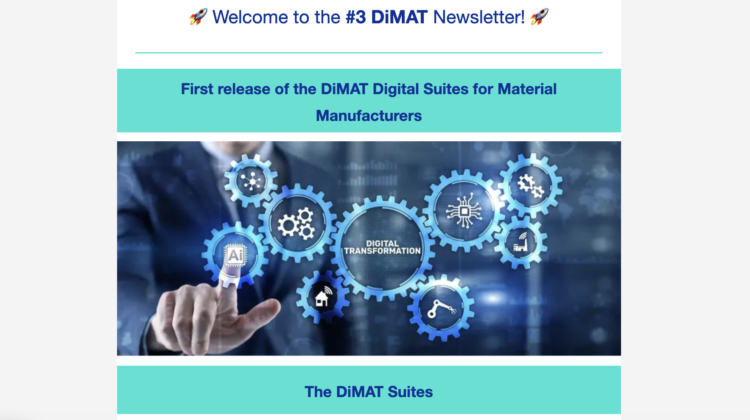
Newsletter #3: Dive into Our Latest Achievements!
DiMAT’s third Newsletter is Out!
Content:
First Release of the DiMAT Digital Suites for Material Manufacturers
The DiMAT Suites
The DiMAT Suites provide a comprehensive collection of nine toolkits designed to meet the diverse production needs of material manufacturing companies. The first release and demonstration of the toolkits were presented during DiMAT’s third plenary meeting in July 2024 in Athens, Greece.
DiMAT Data and Assessment Suite (DiDAS)
The first release of the DiMAT Data and Assessment Suite includes the initial versions of three toolkits: DiMAT Open Cloud Materials Database (CMDB), DiMAT Materials Knowledge Acquisition Framework (KAF), and DiMAT Materials Environmental and Cost Life Cycle Assessment (MEC-LCA). These toolkits demonstrate their core functionalities and user interface design, providing users with a glimpse into their capabilities.
The suite enables users to store and assess heterogeneous data from simulations, experiments, and production processes. Future updates will strengthen connections between these toolkits and the broader DiMAT ecosystem.
The Three Toolkits:
DiMAT Open Cloud Materials Database (CMDB): A cloud-based platform for storing and managing diverse materials data, ensuring FAIR data handling, global search capabilities, and semantic technology integration for standardization. Future enhancements include improved usability, data integration, and linking CMDB to other DiMAT toolkits.
DiMAT Materials Knowledge Acquisition Framework (KAF): Designed to classify materials, properties, and processes in a dynamic Knowledge Graph (KG). Features include AI-driven material substitution recommendations, CSV-file uploads, and query-based data exploration. Future work will enhance vocabulary integration with CMDB and establish a shared data interface.
DiMAT Materials Environmental and Cost Life Cycle Assessment (MEC-LCA): Provides high-level environmental and economic impact assessments via interactive dashboards. Future enhancements focus on integrating pilot data, improving connectivity with other DiMAT toolkits, and conducting user testing.
The DiMAT Data and Assessment Suite helps SMEs manage fragmented data, simplifying processes like life cycle assessments and optimizing manufacturing workflows.
DiMAT Modelling and Design Suite (DiMDS)
The first release of the DiMAT Modelling and Design Suite includes three toolkits: DiMAT Materials Design Framework (MDF), DiMAT Materials Modeler (MM), and DiMAT Materials Design (MD). These tools assist in designing advanced materials and optimizing their performance.
The Three Toolkits:
DiMAT Materials Design Framework (MDF): Provides powerful search functionalities in CMDB and generates insights for material modeling. It consists of three components: a correlation component (identifies relationships between stored data), a materials relation component (provides material model information), and an exploration component (enables advanced searches).
DiMAT Materials Modeler (MM): Predicts material properties and behavior during manufacturing, utilizing AI-driven models. Future updates will focus on validating pilot projects and refining prediction accuracy.
DiMAT Materials Design (MD): Uses Virtual Testing to predict mechanical and thermal properties of complex materials. Current capabilities focus on layered materials with unidirectional reinforcement, with future plans to expand modeling capabilities and enhance data connectivity.
DiMAT Simulation and Optimisation Suite (DiSOS)
The DiMAT Simulation and Optimisation Suite empowers users with advanced simulation tools to predict mechanical properties, optimize production processes, and implement digital twins. Designed specifically for SMEs, this suite offers cost-effective, scalable, and user-friendly solutions to enhance industrial workflows.
The Three Toolkits:
DiMAT Materials Mechanical Properties Simulator (MMS): Predicts key mechanical properties such as flexibility, strength, and creep by leveraging molecular dynamics, finite element analysis, and Explainable AI (XAI).
DiMAT Materials Processing Simulator (MPS): Optimizes manufacturing processes using AI-driven predictions. Recent advancements include simulations for melt spinning, epoxy resin curing, and glass bending.
DiMAT Digital Twin for Process Control (DTPC): Provides real-time monitoring and predictive analytics through interactive Grafana dashboards, alerts, and time-series forecasting.
Launch of the DiMAT Pilots – Suite and Toolkit Tests
DiMAT solutions will be tested by manufacturing companies within the DiMAT consortium through four pilot projects. These pilots will evaluate the impact of the DiMAT Suites and Toolkits on efficiency, product quality, and market responsiveness.
The Four Pilots:
Synthetic Textiles Production (Polymer): NaturePlast, AITEX, and TECNORED optimize compounding, melt spinning, and net knitting processes using multiple DiMAT toolkits.
UAVs Manufacturing with Advanced Composite Materials (Composite): ACCELI, CETMA, and CETCOMP leverage DiMAT tools for UAV component design, process optimization, and material selection.
Innovative Glass Forming Process (Glass): Hegla-Hanic integrates ERP and production software to enhance glass bending precision through digital twins and laser technology.
New Product Development Process (Graphite): Imerys Graphite & Carbon optimizes carbon materials for Li-ion batteries using DiMAT toolkits for data correlation and performance analysis.
DiMAT Community and Call for Early Adopters
DiMAT is launching an Early Adopters Call in October 2024, inviting up to four material manufacturing SMEs to test the DiMAT Suites and toolkits. Selected companies will receive hands-on support, explore digital solutions, and provide feedback to shape the final product.
Interested companies can join the DiMAT Community via DiMAT Community Website to stay informed about upcoming activities.
Sister Projects: PIONEER and metaFacturing
DiMAT collaborates with PIONEER and metaFacturing, selected under the HORIZON-CL4-2022-RESILIENCE-01 call, to revolutionize manufacturing through digitalization.
PIONEER Project
PIONEER develops a digital platform to trace and optimize the entire product lifecycle. It integrates adaptive control loops, hybrid modeling, and an open marketplace to support efficient and sustainable manufacturing.
metaFacturing Project
metaFacturing brings together market leaders to establish a Digital Twin-based process setup and control framework for sustainable metal part production. The project focuses on reduced scrap, efficient process simulation, and continuous life cycle assessment.
OpenZDM: A Zero-Defect Manufacturing Initiative
DiMAT also introduces the openZDM platform—an initiative aimed at delivering high-quality, zero-defect manufacturing solutions for European industries. With five industrial pilots, openZDM aims to enhance efficiency, waste reduction, and sustainability.
Stay updated by following DiMAT on social media and subscribing to openZDM news.

